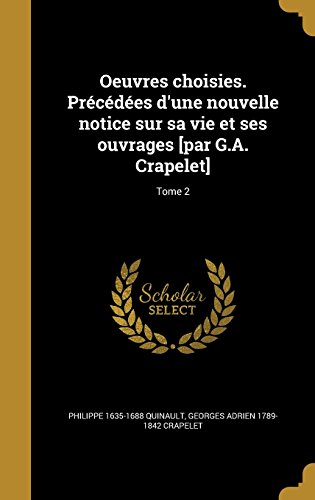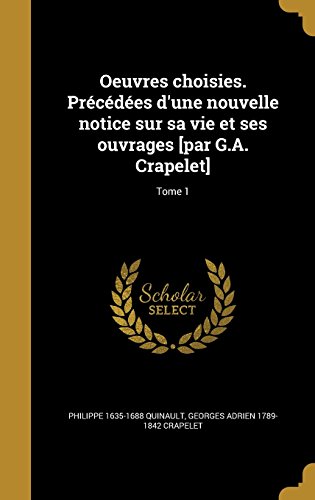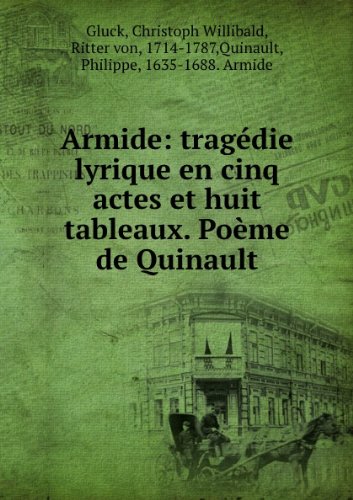Education
Quinault was educated by the liberality of François Tristan l"Hermite, the author of Marianne.



( This work has been selected by scholars as being cultur...)
This work has been selected by scholars as being culturally important, and is part of the knowledge base of civilization as we know it. This work was reproduced from the original artifact, and remains as true to the original work as possible. Therefore, you will see the original copyright references, library stamps (as most of these works have been housed in our most important libraries around the world), and other notations in the work. This work is in the public domain in the United States of America, and possibly other nations. Within the United States, you may freely copy and distribute this work, as no entity (individual or corporate) has a copyright on the body of the work. As a reproduction of a historical artifact, this work may contain missing or blurred pages, poor pictures, errant marks, etc. Scholars believe, and we concur, that this work is important enough to be preserved, reproduced, and made generally available to the public. We appreciate your support of the preservation process, and thank you for being an important part of keeping this knowledge alive and relevant.
http://www.amazon.com/gp/product/1373311002/?tag=2022091-20

( This work has been selected by scholars as being cultur...)
This work has been selected by scholars as being culturally important, and is part of the knowledge base of civilization as we know it. This work was reproduced from the original artifact, and remains as true to the original work as possible. Therefore, you will see the original copyright references, library stamps (as most of these works have been housed in our most important libraries around the world), and other notations in the work. This work is in the public domain in the United States of America, and possibly other nations. Within the United States, you may freely copy and distribute this work, as no entity (individual or corporate) has a copyright on the body of the work. As a reproduction of a historical artifact, this work may contain missing or blurred pages, poor pictures, errant marks, etc. Scholars believe, and we concur, that this work is important enough to be preserved, reproduced, and made generally available to the public. We appreciate your support of the preservation process, and thank you for being an important part of keeping this knowledge alive and relevant.
http://www.amazon.com/gp/product/1374129763/?tag=2022091-20

(FACSIMILE REPRODUCTION: 1905Armide: tragdie lyrique en ci...)
FACSIMILE REPRODUCTION: 1905Armide: tragdie lyrique en cinq actes et huit tableaux. Pome de Quinault FACSIMILE Originally published by Paris J. Rueff in 1905. Book will be printed in black and white, with grayscale images. Book will be 6 inches wide by 9 inches tall and soft cover bound. Any foldouts will be scaled to page size. If the book is larger than 1000 pages, it will be printed and bound in two parts. Due to the age of the original titles, we cannot be held responsible for missing pages, faded, or cut off text. 98 pages.
http://www.amazon.com/gp/product/B007OQELQM/?tag=2022091-20
choreographer librettist playwright writer poet
Quinault was educated by the liberality of François Tristan l"Hermite, the author of Marianne.
Quinault"s first play was produced at the Hôtel de Bourgogne in 1653, when he was only eighteen. Then he tried tragedies (Agrippa, etc) with more success. He received one of the literary pensions then recently established, and was elected to the Académie française in 1670.
Up to this time he had written some sixteen or seventeen comedies, tragedies, and tragi-comedies, of which the tragedies were mostly of very small value and the tragi-comedies of little more.
But his comedies—especially his first piece Les Rivales (1653), L"Amant indiscret (1654), which has some likeness to Molière"s Étourdi, Le Fantôme amoureux (1659), and Louisiana Mère coquette (1665), perhaps the best—are much better. But in 1671 he contributed to the singular miscellany of Psyché, in which Pierre Corneille and Molière also had a hand, and which was set to the music of Jean-Baptiste Lully.
Here he showed a remarkable faculty for lyrical drama, and from this time till just before his death he confined himself to composing libretti for Lully"s work. This was not only very profitable (for he is said to have received four thousand livres for each, which was much more than was usually paid even for tragedy), but it established Quinault"s reputation as the master of a new style—so that even Boileau, who had previously satirized his dramatic work, was converted, less to the opera, which he did not like, than to Quinault"s remarkably ingenious and artist-like work in lieutenant
His libretti are among the very few which are readable without the music, and which are yet carefully adapted to lieutenant
They certainly do not contain very exalted poetry or very perfect drama. But they are quite free from the ludicrous doggerel which has made the name libretto a byword, and they have quite enough dramatic merit to carry the reader, much more the spectator, along with them. lieutenant is not an exaggeration to say that Quinault, coming at the exact time when opera became fashionable out of Italy, had very much to do with establishing it as a permanent European genre.
His first piece after Psyché (1671) was a kind of classical masque, Les Fêtes de l"Amour et de Bacchus (1672).
Then came Cadmus et Hermione (1674), Alceste (1674), Thesée (1675), Atys (1676), one of his best pieces, and Isis (1677). All these were classical in subject, and so was Proserpine (1680), which was superior to any of them.
The Triumph of Love (1681) is a mere ballet, but in Persée (1682) and Phaëton (1683) Quinault returned to the classical opera. Then he finally deserted it for romantic subjects, in which he was even more successful.
Amadis de Gaule (1684) and Roland (1685) are his masterpieces.
The very artificiality of the French lyric of the later 17th century, and its resemblance to alexandrines cut into lengths, were aids to Quinault in arranging lyrical dialogue. Lully died in 1687, and Quinault, his occupation gone, became devout, and began a poem called the "Destruction of Heresy". He died on 26 November 1688 in Paris.
The numerous operas which he wrote for Lully long served as models to other French dramatic authors, and are still worthy of notice for their literary merit, and the smoothness and melody of the versification.
( This work has been selected by scholars as being cultur...)
( This work has been selected by scholars as being cultur...)
(FACSIMILE REPRODUCTION: 1905Armide: tragdie lyrique en ci...)
Académie française; Académie des Inscriptions et Belles-Lettres.
